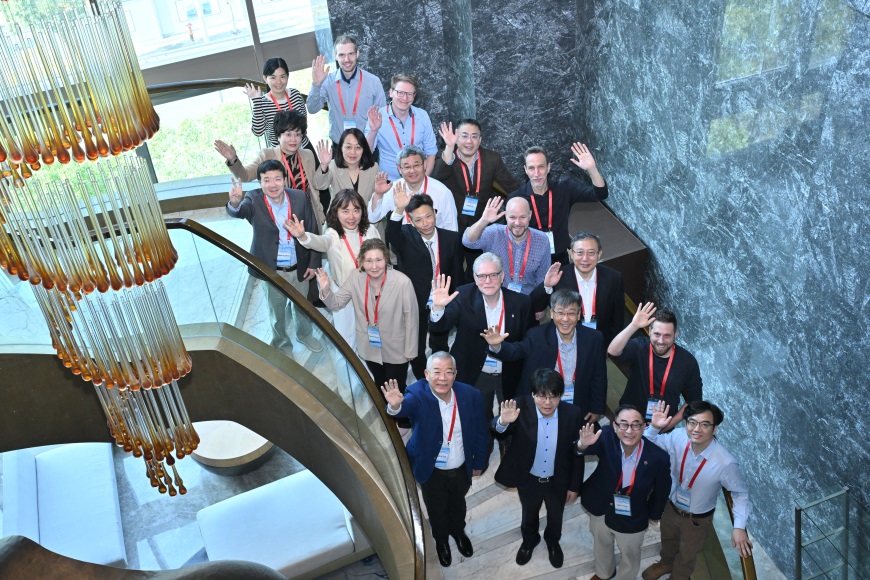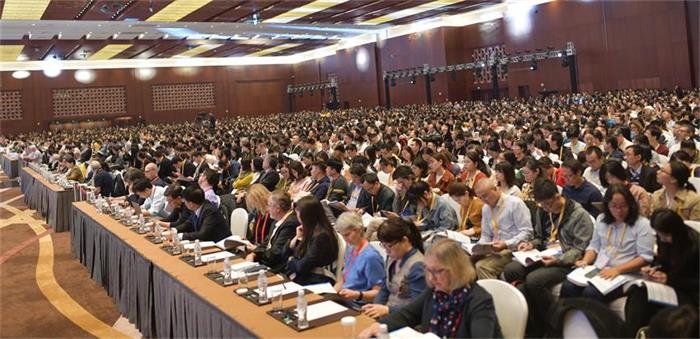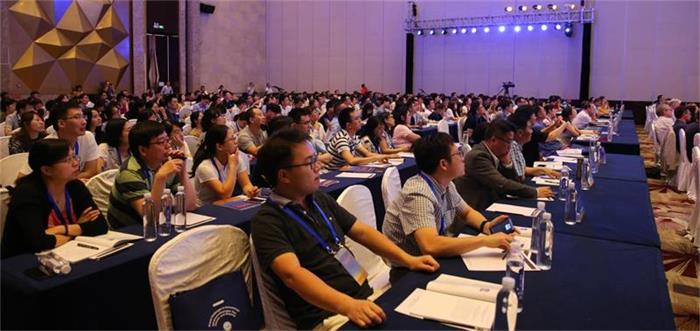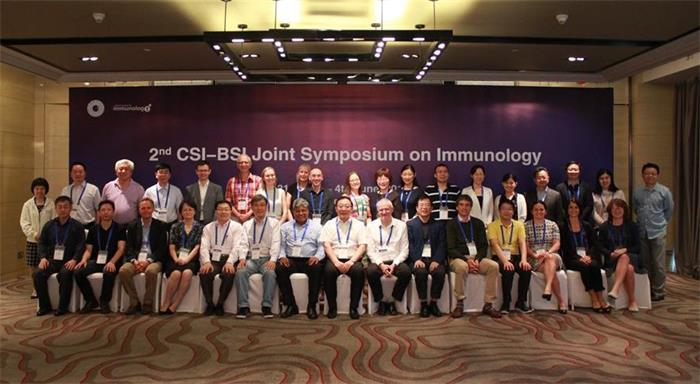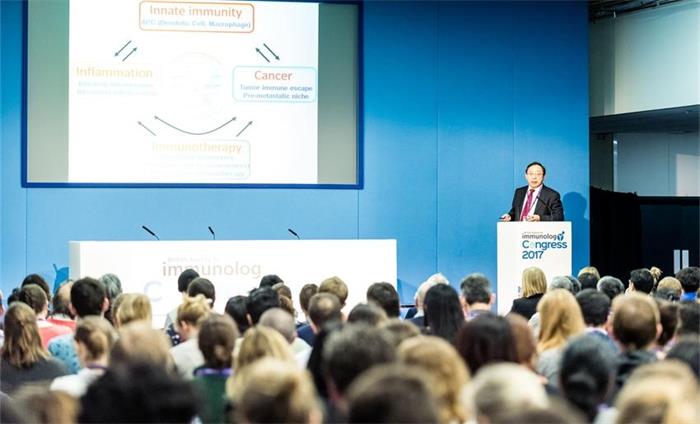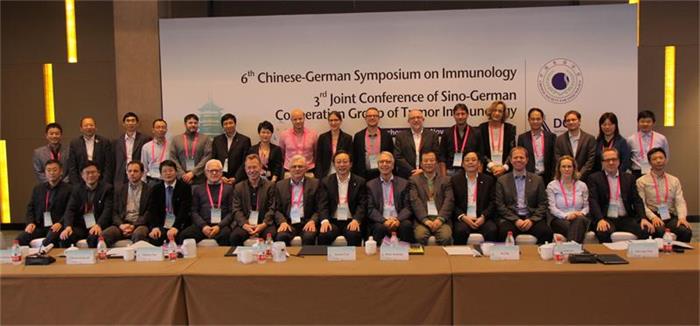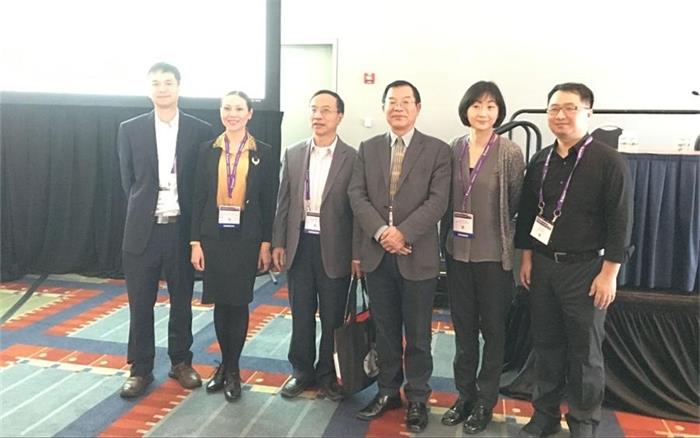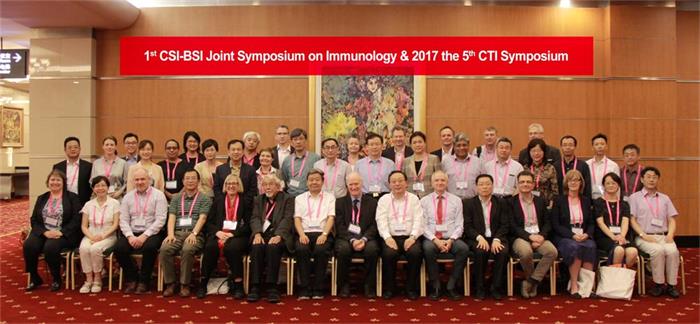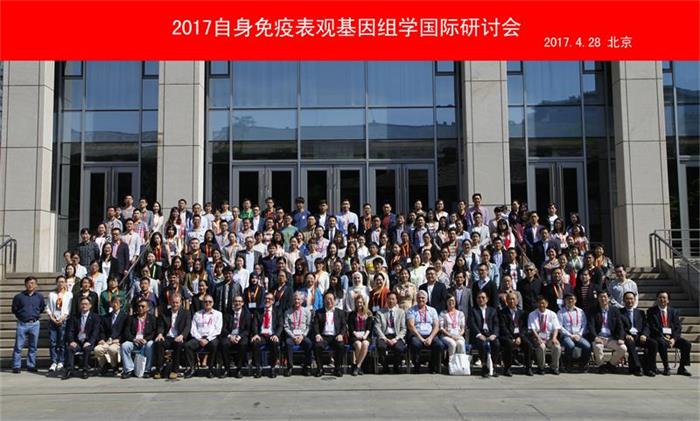Summary of the Chinese Society for Immunology (CSI) Symposium at AAI 2025
![]() International Meetings
International Meetings
-
2025-05-16The 2025 Annual Meeting of the American Association of Immunologists (AAI 2025) was held in Honolulu, Hawaii from May 2 to May 7, 2025, with nearly 2,000 participants in attendance. In addition to classic fundamental immunology research, the conference focused on key topics such as neuroimmunology, computational immunology, systems immunology, tumor immunology, and novel immunotherapy technologies.On the afternoon of May 5, under the organization of Prof. Yiwei Chu, Vice President of the Chinese Society for Immunology (CSI) and faculty at Fudan University Shanghai Medical College, CSI hosted its 14th symposium at the AAI annual meeting. The previous session was held in 2021, led by Prof. Bing Sun, then Vice President of CSI. This year's session, themed "Therapeutic Discovery and Development," was chaired by Prof. Yiwei Chu and Prof. Thirumala-Devi Kanneganti from St. Jude Children's Research Hospital (USA). More than 150 attendees participated in presentations and discussions.Before the academic presentations began, Prof. Yiwei Chu provided an overview of the rapid growth of the CSI. CSI now has the largest membership in the world, with over 5,000 attendees at its annual meetings. The keynote speeches and breakout sessions consistently showcase top-tier talent and groundbreaking research. CSI’s flagship journal, Cellular & Molecular Immunology, boasts an impact factor of 21.8, ranking 5th among 181 immunology journals worldwide. Additionally, CSI actively organizes international conferences in collaboration with FIMSA, China-Japan-Korea, China-UK, and China-Germany partnerships, while maintaining ongoing cooperation with AAI to host sessions at its annual meetings. These initiatives highlight CSI's global presence and commitment to high-quality academic exchange.The session featured 5 distinguished immunologists from China, presenting cutting-edge research aligned with the conference theme: • Prof. Di Wang (Zhejiang University School of Medicine): Another Face of the Pyroptotic Executor in Regulating Physiological and Cellular Homeostasis • Prof. Yiwei Chu (Fudan University Shanghai Medical College): Foxp3 Confers Long-Term Efficacy of CAR-T Cells via Metabolic Reprogramming • Prof. Hanjie Li (Shenzhen Institute of Advanced Technology, Chinese Academy of Sciences): Peripheral Microglia: Discovery and Beyond • Prof. Yangxin Fu (Tsinghua University School of Medicine): Orchestrating Intratumoral DC-T Cell Immunity for Local and Distal Tumor Control • Prof. Yi Zhang (Biotherapy Center, First Affiliated Hospital of Zhengzhou University): Clinical Practice of Cellular Immunotherapy for Cancer These five compelling presentations sparked enthusiastic discussions and insightful questions from immunology researchers, who praised China's advanced immunology research and exceptional talent. As a special segment of the event, Prof. Yiwei Chu, representing CSI, presented honorary certificates to the session chairs and invited speakers, expressing gratitude for their support of CSI’s international academic collaborations.Read More
-
Summary of the 8th Sino-German Joint Symposium on Immunology
2024-04-08Organized by Chinese Society for Immunology (CSI) and German Society for Immunology (DGfI), the 8th Sino-German Joint Symposium on Immunology was held in Xiamen, China during March 18-22, 2024.In the opening ceremony, Prof. Hansjörg Schild, Vice President of DGfI, and Prof. Xuetao Cao, the initiator of the symposium, gave remarks respectively. Both sides looked back the history of this serial symposium, which began in 2010, and spoke highly of the successes and outcomes of the bilateral exchanges and communications for the last 14 years between two societies. The purpose of cooperation between Chinese and German immunologists is always, and especially now, to face the common threats from diseases and environments and to promote the welfare of human beings in general.During the meeting, 22 speakers gave lectures around the topics of Cell Death and Inflammation, Tumor Immunology, Myeloid cells and Immunoregulation, T Cells and B Cells. The CSI speakers are: Prof. Xuetao Cao from Chinese Academy of Medical Sciences, Prof. Zhigang Tian from University of Science & Technology of China, Prof. Jiahuai Han from Xiamen University, Prof. Feng Shao from National Institute of Biological Sciences, Prof. Yiwei Chu from Fudan University, Prof. Bo Huang from Chinese Academy of Medical Sciences & Peking Union Medical College, Prof. Qingqing Wang from Zhejiang University, Prof. Bing Su from Shanghai Jiao Tong University, Prof. Limin Zheng from Sun Yat-sen University,Prof. Dapeng Zhou from Tongji University School of Medicine, Prof. Jie Zhou from Tianjin Institute of Immunology, Prof. Wanli Liu from Tsinghua University, Prof. Juan Liu from Naval Medical University, Prof. Guideng Li from Chinese Academy of Medical Sciences & Peking Union Medical College. The DGfI speakers are: Prof. Stefan Meuer from Ruprecht-Karls Universität Heidelberg, Prof. Hansjörg Schild, Prof. Tobias Bopp, Prof. Michael Delacher and Prof. Johannes Mayer from University Medical Center Mainz,Prof. Kyeong-Hee Lee from Hannover Medical School,Prof. Rainer Glauben from Charite - Universitätsmedizin Berlin, Dr. Martin Väth from Julius-Maximilians-University Würzburg.CSI arranged historical and architectural tours to Fujian Tulou and Gulangyu Iland for meeting participants. As always, the symposium also provides opportunities for participants to experience local culture and history. At the end of the meeting, both sides discussed further cooperation and mutual wish to continue exchange and friendship between two societies, and the following suggestions were proposed: a) To get more funding to support young people to Sino-German cooperations; b) To apply for projects from Sino-German Center for Research Promotion to continue this serial meeting, and the next one will be held in Germany in 2026; c) Both sides will write and send articles to EJI and CMI to promote the symposium.Read More -
Summary of the 17th International Congress of Immunology
2019-11-12Organized by the International Union of Immunological Societies (IUIS) and hosted by Chinese Society for Immunology (CSI), the 17th International Congress of Immunology (the 17th ICI, IUIS 2019) was successfully held from October 19th to October 23rd, 2019 at China National Convention Center (CNCC), Beijing, China.The 4-day programme officially began after an exciting opening ceremony. Following a wonderful congress introduction video there were three speeches made by the Executive Vice President and Chief Executive Secretary of Chinese Association of Science and Technology (CAST), Dr. Jinpeng Huai, President of Steering and Academic Committees of IUIS 2019, Secretary General of CSI, Prof. Xuetao Cao, Vice President of Steering Committee of IUIS 2019, President of IUIS, Prof. Alberto Mantovani from Humanitas University respectively. The opening ceremony was presided by President of Organizing Committee of IUIS 2019, President of CSI, Prof. Zhigang Tian from University of Science and Technology of China.Opening Ceremony(Left, Prof. Zhigang Tian; Middle, Dr. Jinpeng Huai; Right, Prof. Xuetao Cao)As Dr. Jinpeng Huai said, immunology is the most important part of the medical and biological sciences. There have been so many scientific breakthroughs of immunologic research in the last two centuries from the discovery of vaccination to safe organ transplantation, and current immunotherapy broadly used in clinic. Immunological research has changed and redefined modern medicine, and will continue to explore the new diagnostics and treatments of significant health issues. Based on the common awareness of the close relations between science development and human welfare, the scientific associations and societies have been and will be continuing to serve the scientist community to promote collaborations between countries and regions.The ICI is a triennial meeting and it is the first time ICI comes to China. It took CSI seven years to prepare for the congress. In 2012, CSI council decided to host the 17th ICI and began the preparation of bidding presentation. During the 15th IUIS General Assembly (2013, Milan) CSI competed with German, Russian and Greek societies and won the bid. The following years witnessed mutual efforts and every step of IUIS and CSI took to make the 17th ICI not only possible, but hugely successful in several senses.1. Exciting academic programme. 57 leading immunologists including 3 Nobel laureates (Prof. Peter Doherty, Prof. Jules Hoffmann, Prof. Tasuku Honjo) were invited to give keynote, plenary and major symposium lectures. The main topics are the hotspots in the field of immunology: Innate Immunity and Infection, T cell Immunity, B cell Immunity, Immune Cell Subsets in Development and disease, Immune Receptor Signaling, Autoimmunity and Tolerance, Human Immunology and Vaccines, Tumor Immunology and Immunotherapy, Mucosal Immunity and Microbiome, Metabolism and Immunity, Neuro-immune Interaction, Advanced Technology in Immunology.Keynote Lectures(Left, Prof. Peter Doherty; Middel, Prof. Jules Hoffmann; Right, Prof. Tasuku Honjo)2. Achievement of geographic balance and gender balance. Total 198 immunologists were invited to give symposium talks in the congress. They were recommended by the national societies and the female scientists were encouraged to attend the meeting as speakers and co-chairs. The result is satisfying as 50% of the symposium speakers are female immunologists.Highlights of Women Speakers3. The biggest one in the history of ICI. The 17th ICI attracted 6,506 registered delegates from 78 countries and regions. The number of abstracts received is over 3,700, among which 416 were selected to give oral presentations in the workshops and 2,754 were presented as posters.Symposia and WorkshopsPoster Communication4. The multiple awards provided to encourage early career researchers to attend the meeting. Several societies and federations including CSI, American Association of Immunologists (AAI), European Federation of Immunological Societies (EFIS) and Federation of Immunological Societies of Asia-Oceania (FIMSA) offered travel awards to their members, young immunologists from developing countries and female scientists. These awards gave young researchers opportunities to exchange ideas and knowledge together on the most frontiers of immunology and its application. As the host of the congress, CSI provided travel awards to African, South American, German and Indian PostDocs and PhD students, as well as female scientists recommended by the Gender Equality and Career Development Committee of IUIS.Upper Left, On-site Registration; Upper Right, Welcome Reception; Left Down, Conference Dinner; Right Down, Group Photo of VolunteersHosting ICI in China is a dream of the old generation of Chinese immunologists. To make it true CSI made great effort and even skip its annual national meeting this year. Fortunately, CSI received great support from the provincial societies and all its members. With their active participation there were altogether 4,984 registered delegates from China.The intense and pleasant 4-day mind storming, the active performance of Chinese young researchers gave delegates great impression. Invited speakers sent congratulation and thank you letters to CSI for this tremendous and unforgettable occasion of the global immunologist family.Main Events of IUIS 2019 Preparation1. CSI won the bid for the host of the 17th International Congress of Immunology (2013, Milan) 2. IUIS came to China for the site speculation and signed agreement with CSI (2015, Beijing) 3. IUIS and CSI promoted the 17th ICI during the 16th ICI (2016, Melbourne) 4. CSI announced the CSI-African Travel Awards during the FAIS Congress (2017, Tunisia) 5. 2017 Annual Meetings of Academic and Organizing Committees of IUIS 2019 were organized by CSI during the 2017 CSI Annual Meeting (2017, Tianjin) 6. 2018 Annual Meetings of Academic and Organizing Committees of IUIS 2019 were organized by CSI during the 2018 CSI Annual Meeting (2018, Shanghai) 7. Pre-ICI Meetings of Academic and Organizing Committees of IUIS 2019 were organized by CSI (2019, Suzhou)Read More -
Nature Conference “Grand Challenges in Immunology: Immunotherapy for Cancer and Beyond” was held in Qingdao
2019-06-20Nature conference “Grand challenges in immunology: immunotherapy for cancer and beyond”, was successfully held at June 11-13, 2019, in Qingdao, China. It was organized by Chinese Society for Immunology (CSI), University of Science and Technology of China (USTC), Cellular & Molecular Immunology (CMI), Nature Immunology (NI), and Nature Reviews Immunology (NRI). Prof. Zhigang Tian from USTC, Prof. Xuetao Cao from Nankai University, Prof. Arlene Sharpe from Harvard Medical School, and Prof. Jeff Pollard from University of Edinburgh, co-chaired this conference.Prof. Zhigang Tian giving his opening speechProf. Xuetao Cao making his keynote lectureProf. Arlene Sharpe making her keynote lectureBesides co-chairs of the conference, 30 famous immunologists from various countries were invited to give their remarkable speeches on cancer immunotherapy and its challenges, including Prof. Mark Smyth from QIMR Berghofer Medical Research Institute, Australia, Prof. Sebastian Amigorena from PSL Research University, France, Prof. Cornelis Melief from Leiden University Medical Center, Netherland, Prof. James Riley from University of Pennsylvania, Prof. Christopher Klebanoff from James Riley University of Pennsylvania, USA, Prof. Weidong Han from Chinese Peoples Liberate Army Gen Hospital, Prof. Dario Vignali from University of Pittsburgh, Prof. Sergio Quezada from UCL Cancer Institute, UK, Prof. Masanori Hatakeyama from the University of Tokyo, Japan, Prof. Romina Goldszmid from National Cancer Institute, NIH, USA, Prof. Naoko Ohtani from Osaka City University, Japan, Prof. Francesco Colluci from University of Cambridge, Prof. Zusen Fan from Institute of Biophysics, Chinese Academy of Sciences, Prof. Jessica Strid from Imperial College London, Prof. Chenqi Xu from Shanghai Institute of Biochemistry and Cell Biology, CAS, China, Prof. Yuting Ma from Suzhou Institute of Systems Medicine, Chinese Academy of Medical Sciences, Prof. Jeff Rathmell from Vanderbilt University Medical Center, USA, Prof. Bo Huang from Chinese Academy of Medical Sciences, Prof. Carla Rothlin from Yale School of Medicine, Prof. Erwei Song from Sun Yat-Sen University, China, Prof. Fangfang Zhou from Soochow University, China, Prof. Taoyong Chen from Second Military Medical Immunology, China, and Prof. Yang-Xin Fu from UT Southwestern, USA.More than 500 scholars and students from various countries attended this conference, some of which were selected to give poster presentations. Dr. Alexandra Flemming, chief editor of NRI, Dr. Ursula Weiss, senior editor of Nature, and Dr. Zoltan Fehervari, senior editor of NI, also attended this conference. This conference created a platform for international communications between famous immunologists and attendees, and gave an opportunity for direct dialogue between editors from famous journals and immunology researchers.Read More -
2nd CSI-BSI Joint Symposium on Immunology
2018-06-12Co-hosted by Chinese Society for Immunology (CSI) and British Society for Immunology (BSI), the 2nd CSI-BSI Joint Symposium on Immunology has been held in Chongqing on June 1 to 4, 2018. Around 30 immunologists were invited to attend and give a speech in the meeting.The Chinese-British Joint Symposium on Immunology was designed as a platform to provide opportunities for the scientists to know each other, and chances for them to have face to face discussions about their co-interested issues. It is understood that only the mutual knowledge of each other and friendship are the solid start point for the bilateral collaboration between two countries.For the academic ideas sharing and exchange, delegates from China and UK made brilliant reports mainly focused on: novel regulatory immune cell subsets, NK cell function in anti-tumor immunity, virus infectious immunity in infants, innate lymphoid cell, inflammation and immunity in ageing, B cell immunity.15 immunologists from UK participated in this symposium, including Prof. Peter Openshaw, Prof. Xiao-Ning Xu from Imperial College; Prof. Arne Akbar, Prof. Helen Lachmann, Prof. Claudia Mauri from University College London; Prof. Graham Ogg, Prof. Gavin Screaton, Prof. Tao Dong and Associate Prof. Jan Rehwinkel from University of Oxford; Prof. Gary Entrican and Prof. Rose Zamoyska from University of Edinburgh; Prof. Leonie Taams from Kind’s College London; Prof. Chris Buckley from University of Birmingham; Prof. Deborah Dunn-Walters from University of Surrey; BSI Policy and Public Affairs Manager, Ms. Shannon Lacombe. Chinese immunologist representatives included Prof. Xuetao Cao from Nankai University; Prof. Zhigang Tian from University of Science & Technology of China; Prof. Yuzhang Wu and Prof. Lilin Ye from Third Military Medical University; Prof. Bing Sun, Prof. Hong Tang and Prof. Yuting Ma from Chinese Academy of Medical Sciences; Prof. Bing Su from Shanghai Jiao Tong University; Prof. Yiwei Chu from Fudan University; Dr. Qunyan Lv from National Natural Science Foundation of China; Prof. Taoyong Chen and Associate Prof. Juan Liu from Second Military Medical University; Prof. Liwei Lv from University of Hong Kong; Prof. Bo Huang from Chinese Academy of Medical Sciences; Prof. Chengjiang Gao from Shandong University; Prof. Li Yang from Peking University.After the academic part of the meeting, Chinese and British experts discussed and made suggestions on how to foster further bilateral collaboration in immunology research in different levels. Agreements have been made to initiate the joint young immunologist exchange program, collaboration information sharing and promoting, and put more British represent into the 17th International Congress of Immunology, which will be held during October 2019 in Beijing.This year is the 30th anniversary of CSI’s founding and there will be a celebration ceremony during the 13th Annual Meeting of Chinese Society for Immunology. BSI president and secretary general received the invitation from CSI to attend the meeting.Read More -
Summary of CSI & BSI collaboration during the 2017 BSI Congress
2017-12-28The 2017 BSI (British Society for Immunology) Congress was held during December 4-7 in Brighton. The Secretary General of CSI, Prof. Xuetao Cao was invited to the Congress. On December 5, after the opening ceremony, Prof. Cao gave a plenary speech with the title of “Epigenetic regulation and antiviral immunity and inflammation”, sharing his team’s discoveries with more than 1,000 delegates of the meeting. His talk aroused undiluted echoes among the audiences, which will greatly enhance the oversea influence of Chinese immunology research.During the meeting, Prof. Cao also had a fruitful discussion with the President of BSI, Prof. Peter Openshaw, the Chief Executive, Ms. Jo Revill and Prof. Tao Dong from Oxford University. A few things about the further collaboration between CSI and BSI were proposed and settled, including 1) the date and place for 2018 CSI/BSI Symposium, 2) the CSI Travel Awards for the UK early career researchers to attend the CSI Annual Meeting, 3) BSI’s participation in academic committee for the ICI in Beijing 2019, 4) the opportunity for UK postdoc researchers to apply for immunology fellowships to work in both countries on a project of importance, 5) BSI’s working on new pages for its website where Chinese and UK laboratories can showcase their work, the name of the PIs and areas of interest.The meeting shows a continuous effort from both societies after the same successful one held in May this year in Shanghai. And for CSI, this collaboration platform is also a significant part of its international partnership under the “One World One Health” proposal.Read More -
6th Chinese-German Symposium on Immunology & 3rd Joint Conference of Sino-German Cooperation Group of Tumor Immunology
2017-12-14The 6th Chinese-German Symposium on Immunology & the 3rd Joint Conference of Sino-German Cooperation Group of Tumor Immunology sponsored by the Sino-German Center was held from November 16 to November 19 in Hangzhou, China. The symposium was jointly organized by Chinese Society for Immunology (CSI) and German Society for Immunology (DGFI), and co-chaired by Professor Zhigang Tian and Professor Xuetao Cao, the President and the Secretary General of CSI from China, and Professor Dieter Kabelitz and Professor Stefan Meuer, two former Presidents of DGFI from Germany.This series of symposium was initiated 7 years ago by CSI and DGFI to provide a venue for top level scientific exchange in immunology and to promote interaction, collaboration and friendship between immunologists, especially for the young generation, from the two countries. The joint symposium has been successfully held for six times with meeting place alternated in Germany and China of each year.In the opening ceremony, Professor Zhigang Tian and Professor Xuetao Cao from CSI, and Professor Dieter Kabelitz and Professor Stefan Meuer from DGFI conveyed very wonderful words and remarks reflecting the long-time friendship and cooperation between the two societies both on the organizational and personal levels and perspectives of even greater new development in years to come.15 immunologists representing CSI participated the meeting, including Prof. Xuetao Cao, Prof. Wei He, Prof. Bo Huang, and Prof Xiaofeng Qin from Chinese Academy of Medical Sciences, Prof. Zhigang Tian from University of Science and Technology of China, Prof. Yuzhang Wu from Third Military Medical University, Prof. Liwei Lu, from the University of Hong Kong, Prof. Zhengfan Jiang from Peking University, Prof. Wanli Liu from Tsinghua University, Prof. Taoyong Chen from Second Military Medical University, Prof. Youcun Qian from Chinese Academy of Sciences, Prof. Zhinan Yin from Jinan University, Prof. Yiwei Chu from Fudan University, and Prof. Linrong LU and Prof. Qingqing Wang from Zhejiang University. On the DGFI side, a delegation of 16 scientists were selected to attend this year’s symposium, including Prof. Stefan Meuer and Dr. Suzzane Roth from University of Heidelberg, Prof. Dieter Kabelitz, Prof. Ottmar Janssen and Dr. Marcus Lettau from University of Kiel, Prof. Jurgen Wienands and Prof. Holger Reichardt from University of Goetingen, Prof. Reinhold Schmidt from University of Hannover, Prof. Carsten Watzl from Leibniz Research Center at Dortmund, Prof. Hnas-Martin Jaeck and Prof. Diana Dudziak from University Hospital Erlangen, Prof. Thomas Kamradt from University of Jena, Prof. Friederike Berberich-Siebelt from University of Wuerzburg, Prof. Vigo Heissmeyer from University of Munich, Dr. Jan Kroenke from University Hospital Ulm, Prof. Tobia Bopp from University of Mainz.The major theme of this year’s symposium centers on inflammation, immune regulation and tumor immunity. The scientific program covered broad and vibrant research areas in innate immunity, regulation of T cell signaling, B cell function and disease intervention, NK cell and immune homeostasis, gamma/delta T cells and cancer immunotherapy, inflammation and cancer development, autoimmune disorder and novel immune-based therapeutics, including two days of full-fledged plenary talks and one intense day of focused discussion group presentations made by 30 scientists from both countries. In each session, the presentations brought up in depth discussion regarding to the key scientific questions of the field, new discoveries and technology advances. The presentations showcased the great progress made in the past year, both in basic research addressing the fundamental immunological questions and in clinical investigation leading to the development of novel approaches for the treatment and intervention of immune-related diseases. The strength and potential of immunological research in China and Germany were well exhibited, especially among those younger generation of investigators. In many areas, people from both sides have identified significant matches for partnership and establishing very promising collaborations.As the tradition, apart from the intense and exciting scientific programs, the host and local organization committee have arranged several lovely and delightful social and cultural events featuring the regional history, natural beauty, arts and lifestyle of Hangzhou. The guests thoroughly enjoyed with the tours and visits, and were also very impressed by the great changes and the new appearance of the city crafted for the recent G20 summit held in 2016. The pleasant social activities and warm hospitality graciously planned by the host provided a nice atmosphere promoting more extensive interaction and further development of friendship among the German and Chinese immunologists during the three-day symposium.Again the 6th Symposium is another exemplification of the longstanding cooperation and partnership of CSI and DGFI. In the closing ceremony, the co-chairs from both China and Germany expressed their great appreciation and satisfaction to each other for the joint efforts in putting together the excellent program of the 6th Symposium. All the attendees also thanked the Sino-German Center for the funding support and encouragement for high-level scientific exchange between immunologists of the two countries. As huge emphasis has been placed on better understanding how the immune system helps the body to fight against diseases and maintain human health in recent years, immunological research now permeates into almost every corners of modern life sciences and medicine, and the community has expanded tremendously, especially in China. No doubt for everybody who attended this exciting meeting that there are vast opportunities lying ahead to further expand and deepen the international cooperation of Sino-German immunology societies which play even bigger role on the world stage in the coming years.Read More -
CSI Symposium of American Association of Immunologists 2017 Annual Meeting
2017-06-14Chinese Society for Immunology (CSI) symposium of American Association of Immunologists (AAI) 2017 Annual Meeting was held in Washington DC, USA, May 13th, 2017. It has been 10 years since CSI began to host a society symposium at AAI annual meeting. Prof. Arlene Sharpe, President of AAI, delivered a wonderful opening speech. Prof. Zhigang Tian, President of CSI, made a retrospection of the 10 year symposium history and promoted the17th International Congress of Immunology (ICI), hosted by International Union of Immunological Societies (IUIS) and CSI, which will be held in 2019 in Beijing, China.The topic of Symposium is Host Responses to Infection and Tumor, co-chaired by Prof. Zhigang Tian from University of Science and Technology of China and Prof. Yangxin Fu from UT Southwestern Medical Center. 5 invited professors made talks and shared their findings, including: 1) Cuihua Liu, CAS Key Lab. of Pathogenic Microbiol. and Immunol., Inst. of Microbiol.,Chinese Acad. of Sci., China: Regulation of host cellular functions by M. tuberculosis secreted effector proteins; 2) Xiaoyu Hu, Inst. for Immunol., Tsinghua Univ., China: Regulation of inflammation by Notch signaling; 3) Chenqi Xu, Inst. of Biochem. and Cell Biol., Chinese Acad. of Sci., China: Membrane lipids and T cell signaling; 4) Lilin Ye, Inst. of Immunol., Third Military Med. Univ., China: T cells in B cell follicle; 5) Lai Wei, Sun Yat-sen Univ., China, Epigenetic therapy for inflammatory disease targeting helper T cells.CSI symposium of AAI has been witnessing the rapid development of immunological research in China, for one thing, the symposium became more and more attractive. There are about 300 AAI participants attended the meeting, sharing and exchanging ideas, discussing interested topics.Meanwhile, in order to promote the 17th ICI, after the successful promotion during the 16th ICI in Melbourne, CSI and IUIS for the second time worked together, distributed the conference brochures, give aways with Chinese characteristics during the AAI, which proved to be another success.Read More -
1st CSI-BSI Joint Symposium on Immunology & 2017 the 5th CTI Symposium
2017-06-12Co-hosted by Chinese Society for Immunology (CSI), British Society for Immunology (BSI), Chinese Academy of Medical Sciences (CAMS), Oxford University, co-organized by National Key Laboratory of Medical Immunology, the 1st CSI-BSI Joint Symposium on Immunology & 2017 the 5th CTI Symposium has been held in Shanghai on May 24 to 28th, 2017. At the opening ceremony, Prof. Xuetao Cao, Secretary-General of CSI, Prof. Zhigang Tian, President of CSI, Prof. Zihe Rao from Tsinghua University, Prof. Darren Nash from Oxford University, and Prof. Peter Openshaw, President of BSI gave speeches respectively, expressing their thoughts and confidence of the further collaboration between immunologists of two countries based on the platforms of CTI, CSI and BSI.It was the first time for Chinese-British Joint Symposium on Immunology, a further step for the bilateral collaboration between two countries, including the on-going collaborative education program for young scholars providing a strong support for the continuous exchanges and development of immunology between China and British.32 experts from China and UK made brilliant reports mainly focused on: T cell and anti-tumor immunity; NK cell and anti-tumor immunity; Immune response to HIV, viral infections; Epigenetic regulation, innate response and inflammation; immune editing of cancer. The latest results and hot spots showing in these reports not only displayed the originality in basic immune research but also showed the potential applications in clinical immunology. Meanwhile, these reports demonstrated the continuous efforts made by the immunologists of both sides to promote the transformations from basic research into clinic applications.18 immunologists from UK participated in this symposium, including Prof. Tom Blundell from Cambridge University, Prof. Andrew McMichael, Prof. Tao Dong, Prof. Darren James Nash, Prof. Vincenzo Cerundolo, Prof. Jane Alison McKeating, Prof. Ling-Pei Ho, Prof. Sarah Louise Rowland-Jones, Prof. Alison Simmons from Oxford University, Prof. Andrew Macdonald from Manchester Collaborative Centre for Inflammation Research (MCCIR), Prof. Andrew James Godkin from Cardiff University, Prof. Anne O’Garra from The Francis Crick Institute, Prof. Arne Nalpon Akbar from UCL, Infection & Immunity, Prof.Marina Botto, Prof, Peter John Morland Openshaw, Prof.XiaoNing Xu from Imperial College London, Prof. Timothy John Elliott from University of Southampton, Prof. Richard Michael Maizels from University of Glasgow. Prof. Catherine Georgia Kenyatta from KEMRI-Wellcome Trust Research Programme. Chinese immunologist representatives included Prof. Zihe Rao, Prof. Li Wu, Prof. Chen Dong from Tsinghua University, Prof. Xuetao Cao from Chinese Academy of Medical Sciences; Prof. Zhigang Tian from School of life sciences, University of Science & Technology of China; Prof. Jiahuai Han from Xiamen University, Prof.George F. Gao, Prof. Bing Sun from the Chinese Academy of Sciences; Prof.Fusheng Wang from Beijing 302 Hospital. Prof. Limin Zheng from Sun Yat-Sen University; Prof.Qingqing Wang from Zhejiang University, Prof. Zhengfan Jiang from Peking University; Prof. Yuzhang Wu from Third Military Medical University. Prof. Bing Su from Shanghai JiaoTong University.As an important part of the symposium, Chinese and British experts discussed and made suggestions on how to further improve the bilateral collaboration in immunology research in different levels. Agreements have been made to initiate the joint young immunologist program, gender equality program and to continue the joint symposium on immunology.This symposium has promoted and will continue to promote exchanges and collaboration between Chinese and British scientists, make unremitting efforts and positive contributions in promoting the development of immunology in the two countries.Read More -
2017 International Symposium on Autoimmunity: Epigenomics and Beyond
2017-05-152017 International Symposium on Autoimmunity: Epigenomics and Beyond was held in Beijing on April 27-29, 2017.This meeting was sponsored by The Chinese Society of Immunology, Chinese Academy of Medical Science, Peking Union Medical College, The Second Xiangya Hospital of Central South University, The University of California at Davis School of Medicine, and the University of California at San Diego. This meeting was co-chaired by Prof. Xuetao Cao, President of Chinese Academy of Medical Sciences, Secretary-General of Chinese Society for Immunology, Prof. M. Eric Gershwin, The University of California at Davis, Prof. Ajit Varki, University of California, San Diego (UCSD), Prof. Qianjin Lu, Central South University. 18 top scientists from China, America, England, Japan, Australia, Sweden, Italy, and Colombia focused on Autoimmunity and Epigenomics theme, in particular, exploration of the challenges and roadblocks to move and create unique opportunities in refractory autoimmune disease. About 500 Research Staffs, clinicians, Graduate student representatives took part in the Symposium.At the opening ceremony, Prof. Xuetao Cao and Prof. Qianjin Lu delivered a welcome speech, respectively. They gave experts and representatives a warm welcome and wished the conference a complete success. Next, scientists delivered wonderful presentations based on their own research fields and hot topics, and focusedmain fields aboutepigenetic regulation of immunization and autoimmune, innate immune and inflammatory response, epigenomics and environment, epigenetic and translational medicine, as well as systemic lupus erythematosus, rheumatoid arthritis, systemic sclerosis, sicca syndrome, autoimmune liver disease, autoimmune diabetes.On the last day of the symposium, Prof. Zhigang Tian and Prof. Ajit Varki delivered a warm closing speech to congratulate the success of this Symposium, respectively. This cutting-edge life science conference provided an excellent opportunity for participants from across the world to make fruitful connections, to exchange new ideas and share new knowledge, and to enjoy the beauty of science.Read More



